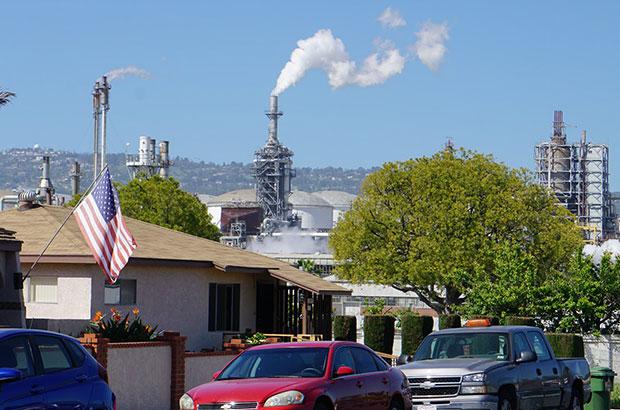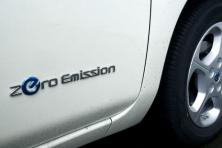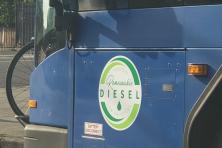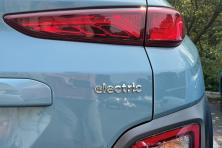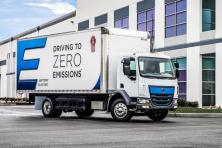It's well understood by doctors and researchers that people with underlying conditions like hypertension and asthma are more vulnerable to complications from COVID-19. Recent reports have highlighted the tragic reality that COVID-19 disproportionately claims the lives of Black people, who disproportionately suffer from those underlying conditions, which are often caused and aggravated by air pollution. For decades, communities of color have experienced, been disproportionately affected by and have been fighting to reverse health burdens from air pollution and other environmental hazards, which is known as environmental racism. Like climate change, COVID-19 exposes and intensifies health disparities that exist in the United States for those most vulnerable. US policy is entrenched with systemic racism which has created wide-ranging disparities in health, wealth and more between people of color (particularly Black people) and white people.
Environmental racism is a persistent and pervasive form of social inequality which subjects minority communities — people of color and more specifically Black and Indigenous people — to disproportionate impacts from environmental stresses and hazards. Due to racist public policies like urban renewal districts, redlining, and inner-city highway construction, environmental hazards such as toxic concentrations of air pollution are located in and around low-income and communities of color, contributing to disproportionate cardiovascular and respiratory illnesses that low income and communities of color suffer from.
Of all types of air pollution, PM 2.5 poses the greatest risk to human health. PM 2.5 stands for particulate matter that is 2.5 micrometers or smaller and is a type of air pollution generally emitted from power plants, vehicles and other combustion engines. PM 2.5 is inhaled into your lungs and can even make its way into our bloodstreams where studies have shown it to cause not only respiratory illnesses but cardiovascular illnesses. The American Heart Association has suggested that long-term exposure to PM 2.5 plays a role in hypertension, heart failure, and diabetes. In 2018, a study confirmed that Americans don’t breathe in air pollution equally. This study found that those experiencing poverty are exposed to 35% more PM 2.5 air pollution than the average American, non-whites are exposed to 28% more than average, and Black people are exposed to a staggering 54% more PM 2.5 air pollution than average.
This study’s conclusion points to America’s racist reality of health disparities that environmental racism has created for low-income people, people of color and Black people in particular. In the United States, Black people are more likely to develop hypertension and die from heart disease than any other racial group. Black people are also among the most susceptible to diabetes, second only to Latinx people. From what we know, older adults and people of any age who have underlying conditions such as diabetes, respiratory illnesses, and heart disease are at a higher risk of developing severe illness or even dying from COVID-19. In our society, Black people disproportionately have those underlying conditions and are therefore disproportionately at risk of developing complications from COVID-19. Several states have already reported outrageous COVID-19 mortality disparities. In Wisconsin, where Black people represent 6% of the state population, they account for half of the state’s COVID-19 deaths. Similarly, 32% of Louisiana’s population is Black, but they represent a staggering 70% of the state’s COVID-19 deaths and the list goes on.
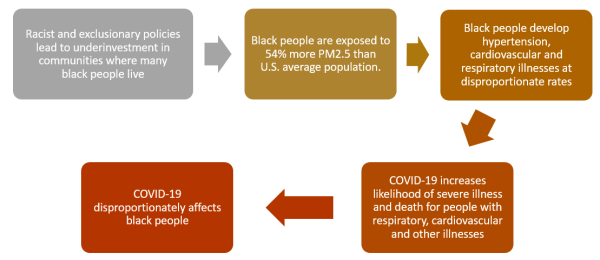
Like COVID, climate change is a stress multiplier, meaning that it applies further pressure on our system as a whole but also with far greater intensity on vulnerable populations and communities. With this in mind, we must focus on creating policy solutions and programs in the face of pandemics like COVID and the climate change crisis that shrink racial and social inequities while prioritizing benefits to vulnerable populations that will ultimately create positive externalities benefiting society at large.
For my work and the work of my colleagues, we aim to tackle this issue by pledging that we must not “go back to normal” once the worst of COVID-19 is over. Back to normal would mean allowing racial inequities such as health burdens, environmental hazard exposure, and more injustices to continue and worsen. In the climate change advocacy realm, we are working to ensure that the policies and programs we champion are led through a social and racial justice lens that prioritizes the needs of and brings benefits to low-income, communities of color, and other vulnerable and underserved populations.
For example, a solution to reduce toxic air pollution AND address the climate crisis is moving towards adopting 100% clean, renewable energy and creating a transportation system that runs on electricity (“transportation electrification”) instead of fossil fuels. Pushing these policies forward with a racial and social equity lens means that we are ensuring that what we are advocating for prioritizes improved air quality and other transportation electrification benefits in low-income and communities of color and is paired with opportunities to enhance economic opportunities such as quality green job creation and workforce development. We are also holding ourselves accountable for ensuring that low-income and communities of color are able to participate, shape, and benefit from a clean energy transition. Like COVID-19, climate change is a stress multiplier and will continue to disproportionately affect the lives of those most vulnerable first; Black communities, low-income communities and communities of color. We can make it all of our jobs, no matter what field we work in, to create a livable world where these disparities do not exist.
Other Ways to Help:
- Push for anti-racist policies in every sector with the goal of closing racial inequities and reversing hundreds of years of underinvestment and gross neglect on low-income and communities of color.
- Are you a policy advocate? Learn how you can implement policy through a racial equity lens here.
- Are you a concerned citizen? Be a voice for racial inequities by calling your policy makers and supporting policies at the ballot that aim to create benefits for low-income and communities of color. When vulnerable populations are targeted to receive benefits, our society at large benefits.
- Support stricter air quality regulations from the US Environmental Protection Agency.
- As a response to the crisis the EPA isn’t requiring air pollution monitoring. Given the scientific studies of the links of air pollution exacerbating COVID mortality rates, this is exactly the opposite of what we need right now.
- https://www.smartcitiesdive.com/news/groups-blast-epa-move-to-maintain-air-quality-standards-after-higher-pollut/576091
- Support further research on the links between air pollution and COVID-19 by race
- Harvard Study: COVID-19 PM2.5
- Research: Assessing nitrogen dioxide (NO2) levels as a contributing factor to coronavirus (COVID-19) fatality
